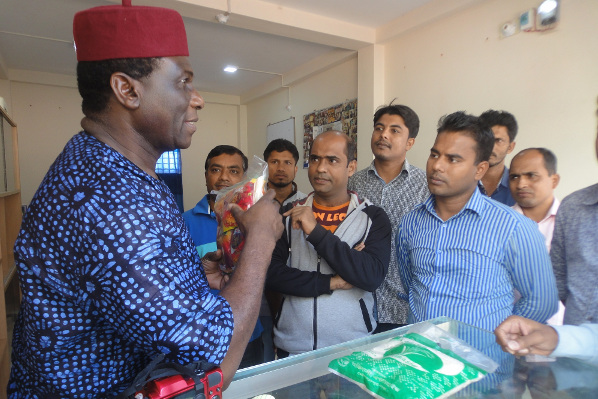
Volunteer Post
An Interview with Johnson Ndi: Youth Entrepreneurship in Bangladesh
F2F Volunteer, Johnson Ndi
This week’s blog comes from F2F volunteer, Johnson Ndi. He is an Organizational Development Specialist who has travelled and worked in over 59 countries across the world, volunteering with numerous NGOs in the area of development. Mr. Ndi served as a Peace Corps Response Volunteer from 2014-2015, working as a membership and marketing communication specialist with the Global Shea Alliances (GSA), a USAID-supported project, in Accra, Ghana. He also served as a Peace Corps Volunteer in Thailand from 2005-2007. Mr. Ndi recently volunteered in Bangladesh with the Farmer-to-Farmer Program, providing youth entrepreneurship development training to staff and members of the USAID-funded Bangladesh Counter Trafficking in Persons (BC/TIP) Program and one of their youth trafficking victims groups, ANIRBAN. While in-country, Mr. Ndi was interviewed by a local magazine, “Bazarzatkaran”. Read below for excerpts from the interview.
Q:You have a lot of experience in the field of entrepreneurship development and now have experience working with Bangladeshi entrepreneurs. Would you tell me the potential of our entrepreneurs?
A:Your country is very rich in untapped resources that can be utilized for the good of the entire people and to curb youth unemployment and trafficking. Bangladesh needs NGOs who are heavily invested in community mobilization and youth/women empowerment activities geared towards sustainable businesses in rural communities.
Q:What are the major limitations of our entrepreneurs?
A: Agriculture is one of the most difficult sectors of the economy. Bangladesh’s smaller agribusinesses frequently harbor decent work deficits, where work is too often for extremely low wages or returns, frequently hazardous, and can take unacceptable forms, such as child or forced labor. Young agri-entrepreneurs lack the know-how and means to effectively address these situations. However, improving the quality of jobs by promoting worker’s rights, extending social protection, and strengthening rural organizations is at the core of agricultural transformation and crucial for achieving sustainable agricultural productivity. Targeted skills development in good practices and awareness-raising can go far to address these deficits, as can be supported through local public and private collaboration. Educational institutions and member-based organizations are effective mechanisms for engaging young people in agriculture, while increasing youth employment through on-farm and off-farm activities.
Q: How can they overcome these problems?
A: This problem can be overcome through education, community mobilization, and sensitization. Given opportunities and incentives, and mindset change, rural youth can profitably be redirected toward agribusiness, service provision, and market-oriented agriculture, with a huge impact upon their rural communities.
This effort must extend well beyond reorientation and formal training, rather it must involve the development of detailed agri-business plans and creditworthy loan applications, leading to the establishment of new business ventures and services across the entire agricultural value chain. It must be built upon commitment at the national level, close collaboration among and with regional development partners to improve the enabling environment, and requires investment by the private sector and financial institutions. Equally important, the program must be attractive to youth, able to challenge counterproductive mindsets through building self-confidence, and must be led and owned by local efforts.
Q: According to your observations, what are the core competencies of our entrepreneurs?
A: Many of the youth involved in entrepreneurship today are increasingly using ICT to support their activities by relying upon mobile phones for their business activities. They also use mobile phones for recordkeeping and to access market prices and new buyers. Here in Bangladesh, I discovered that many young and older entrepreneurs are already tapping into this alternative opportunity to access finances for their businesses. Awareness of and access to these opportunities should therefore be promoted and facilitated for young entrepreneurs and young farmers.
Q: What kinds of qualities are essential to become an entrepreneur?
A: To become an entrepreneur, it is imperative to create and develop a business idea and take the risk of setting up an enterprise to produce a product or service, which satisfies customer needs. An entrepreneur really refers to the person and entrepreneurship defines the process. An entrepreneur is a job-creator, not a job- seeker who:
- has a dream and a vision;
- has the ability to identify and pursue a business opportunity;
- is willing to take the risk;
- undertakes a business venture;
- raises the capital to finance it;
- gathers the necessary physical, financial and human resources needed to operate the business venture;
- sets goals for him/herself and others;
- initiates appropriate action to ensure success; and
- assumes all or a major portion of the risk!

